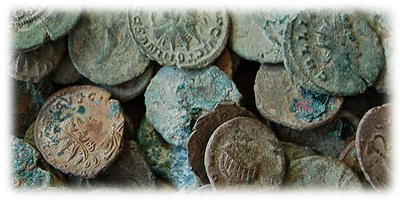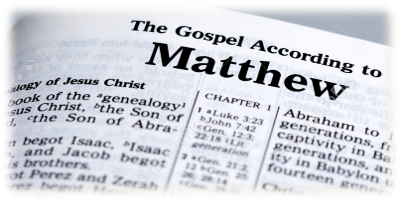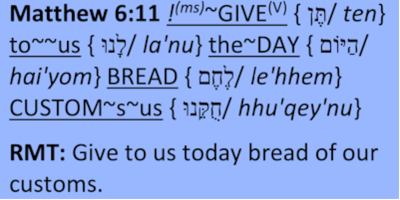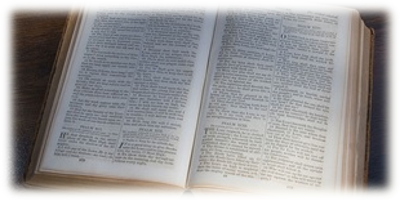I haven’t yet translated very many passages in Matthew, so I don’t have much of a baseline to work with, but I was rather surprised at how closely the modern-day, 19th Century, Salkinson-Ginsburg Hebrew translation of the Greek (the base text that I use in my mechanical translation of the Book of Matthew), matched with the Hebrew in the Shem Tov and the Aramaic Peshitta texts. As is noted in the translation below, there were only a few word differences, but none of these really changed the meaning of the text.
I chose to translate this verse because in two consecutive days, I received two requests to get my view on the word mammon as found in this verse. I can’t think of a time that I had received back-to-back requests like this before, so I figured I better look into it as I don’t believe in coincidences.
Before looking at the word mammon, I needed to mechanically translate the passage to be sure that we have a good idea of what the original text read. You will note that at the end of the verse, I chose to translate the word mammon (which is found in the Aramaic and Greek texts) with the English word “revenue.” I probably would have preferred to use “wealth” or “profit,” but both of those words have already been used in the Mechanical Translation.
Matthew 6:24
NOT {לֹא / lo} [1] he~will~BE.ABLE(V) {יוּכַל / yu'khal} MAN {אִישׁ / ish} to~>~SERVE(V) {לַעֲבֹד / la'a'vod} LORD~s {אֲדֹנִים / a'do'nim} TWO {שְׁנָיִם / shê'na'yim} GIVEN.THAT {כִּי / ki} IF {אִם / im} he~will~HATE(V) {יִשְׂנָא / yis'na} AT {אֶת / et} the~UNIT {הָאֶחָד / ha'e'hhad} and~AT {וְאֶת / wê'et} the~OTHER {הָאַחֵר / ha'a'hheyr} he~will~LOVE(V) {יֶאֱהַב / ye'e'hav} OR {אוֹ / o} he~will~ADHERE(V) {יִדְבַּק / yid'baq} [2] in~UNIT {בָּאֶחָד / ba'e'hhad} and~the~SECOND {וְהַשֵּׁנִי / wê'ha'shey'niy} be~REJECT(V)~ing(ms) {נִמְאָס / nim'as} [3] in~EYE~s2~him {בְּעֵינָיו / bê'ey'naw} [4] NOT {לֹא / lo} you(mp)~will~BE.ABLE(V) {תוּכְלוּ / tukh'lu} to~>~SERVE(V) {לַעֲבֹד / la'a'vod} AT {אֶת / et} the~Elohiym {הָאֱלֹהִים / ha'e'lo'him} [5] and~AT {וְאֶת / wê'et} the~REVENUE {הַמָּמוֹן / ha'ma'mon} [6]
RMT: Man will not be able to serve two lords, given that if he will hate the one, and the other he will love, or he will adhere with one, and the second being rejected in his eyes, you will not be able to serve the Elohiym and the revenue.
[1] The Shem Tov begins this verse with: בעת ההיא אמר יש''ו לתלמידיו; in that time Yeshua said to his students.
[2] Shem Tov and Peshitta: יכבד (yi'ka'ved / he will be heavy); meaning "he will give weight to. "
[3] Shem Tov and Peshitta: יבזה (yiv'zah / he will disdain)
[4] This word is not found in the Shem Tov or Peshitta.
[4] Shem Tov: האל (ha'eyl / the mighty one)
[5] Shem Tov: העולם (ha'o'lam / the world)
Now, with the translation complete, I am pretty confident that the original Hebrew for this passage had the word mammon. Opponents to this would point out that there is no Biblical Hebrew word mammon. However, just because a word does not appear in the Hebrew Bible, it does not mean that the word did not exist in the language; It would just be that that word was not used in the Hebrew Bible. The word mammon is used in the Aramaic, a Semitic language, and it is also found in some texts of the Dead Sea Scrolls.
There is one other possibility that did come to mind as I studied the word mammon. This word could be a translation of the Hebrew word gad. Besides being the name of one of Jacob’s sons, gad is also a Hebrew word that means “wealth” or “profit,” just as mammon does. But not only that, both the Hebrew word gad and the Aramaic word mammon are also the names of gods, both being the gods of, you guessed it, “wealth and profit.” With this train of thought, it is possible that the mammon in Matthew 6:24 is the name of a god that is being contrasted with Elohiym— “you will not be able to serve the Elohiym and the Gad/Mammon.
 | Join my mail list and discover new insights into the language and culture of the Bible — plus, get a FREE e-book |






